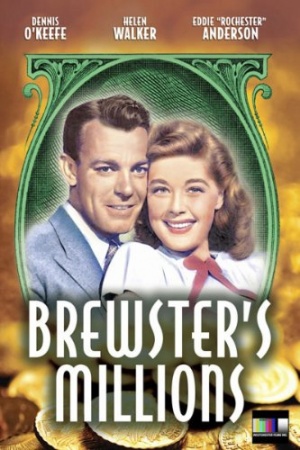Brewster Millions: Difference between revisions
No edit summary |
No edit summary |
||
| (One intermediate revision by the same user not shown) | |||
| Line 4: | Line 4: | ||
|region=North America | |region=North America | ||
|artist=Allan Dwan, | |artist=Allan Dwan, | ||
|subject=Political/Economic/Social Opinion | |||
|confronting_bodies=Lloyd T. Binford, Head, Memphis Censor Board | |||
|medium=Film Video | |||
|date_of_action=1945 | |date_of_action=1945 | ||
|location=Memphis, Tennessee | |location=Memphis, Tennessee | ||
| Line 10: | Line 13: | ||
"But it was Binford's attitude toward blacks that caused him — and Memphis — the most condemnation. Binford was absolutely opposed to movies showing blacks and whites together on the same social level. In 1945, he blocked the hit musical Annie Get Your Gun from Ellis Auditorium because there were blacks in the cast "who had too familiar an air about them." For the same reason, he banned the film Imitation of Life (1934) with Claudette Colbert and Brewster's Millions (1945) with Eddie "Rochester" Anderson because certain scenes "gave too much prominence to Negroes." - memphis flyer | "But it was Binford's attitude toward blacks that caused him — and Memphis — the most condemnation. Binford was absolutely opposed to movies showing blacks and whites together on the same social level. In 1945, he blocked the hit musical Annie Get Your Gun from Ellis Auditorium because there were blacks in the cast "who had too familiar an air about them." For the same reason, he banned the film Imitation of Life (1934) with Claudette Colbert and Brewster's Millions (1945) with Eddie "Rochester" Anderson because certain scenes "gave too much prominence to Negroes." - memphis flyer | ||
|description_of_result=Banned in Memphis | |description_of_result=Banned in Memphis, | ||
To show the films in Memphis, local distributors had to delete these scenes. As a result, some movies shown here were minutes shorter than the same films shown in other cities, because Binford ordered the complete removal of scenes featuring prominent black performers like Duke Ellington or Cab Calloway. | |||
|image=Brewsters Millions.jpg | |image=Brewsters Millions.jpg | ||
|source=https://www.imdb.com/title/tt0037557/?ref_=fn_al_tt_2, https://www.memphisflyer.com/memphis/banned-in-memphis/Content?oid=1144204 | |source=https://www.imdb.com/title/tt0037557/?ref_=fn_al_tt_2, https://www.memphisflyer.com/memphis/banned-in-memphis/Content?oid=1144204 | ||
}} | }} | ||
Latest revision as of 04:57, 20 November 2018
Artist: Allan Dwan
Year: 1945
Date of Action: 1945
Region: North America
Location: Memphis, Tennessee
Subject: Political/Economic/Social Opinion
Medium: Film Video
Confronting Bodies: Lloyd T. Binford, Head, Memphis Censor Board
Description of Artwork: "Monty Brewster is a penniless, former U.S. Army soldier back from World War II Europe who learns that he has inherited $8 million from a distant relative, but there's a catch: he must spend $1 million of that money in less than two months before his 30th birthday in order to inherit the rest. Since he cannot tell anyone about spending the money as part of the agreement, everyone thinks that Brewster has flipped when he practically knocks himself out on a spending spree to get rid of the $1 million in time." - IMBD
The Incident: The film was banned in Memphis, Tennessee, because the character of an African-American servant, portrayed by Eddie "Rochester" Anderson, was treated too well.
"But it was Binford's attitude toward blacks that caused him — and Memphis — the most condemnation. Binford was absolutely opposed to movies showing blacks and whites together on the same social level. In 1945, he blocked the hit musical Annie Get Your Gun from Ellis Auditorium because there were blacks in the cast "who had too familiar an air about them." For the same reason, he banned the film Imitation of Life (1934) with Claudette Colbert and Brewster's Millions (1945) with Eddie "Rochester" Anderson because certain scenes "gave too much prominence to Negroes." - memphis flyer
Results of Incident: Banned in Memphis,
To show the films in Memphis, local distributors had to delete these scenes. As a result, some movies shown here were minutes shorter than the same films shown in other cities, because Binford ordered the complete removal of scenes featuring prominent black performers like Duke Ellington or Cab Calloway.
Source:
• https://www.imdb.com/title/tt0037557/?ref_=fn_al_tt_2,
• https://www.memphisflyer.com/memphis/banned-in-memphis/Content?oid=1144204
